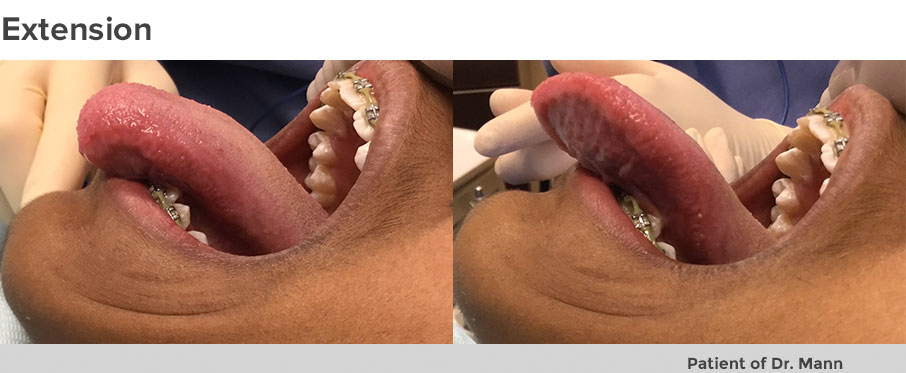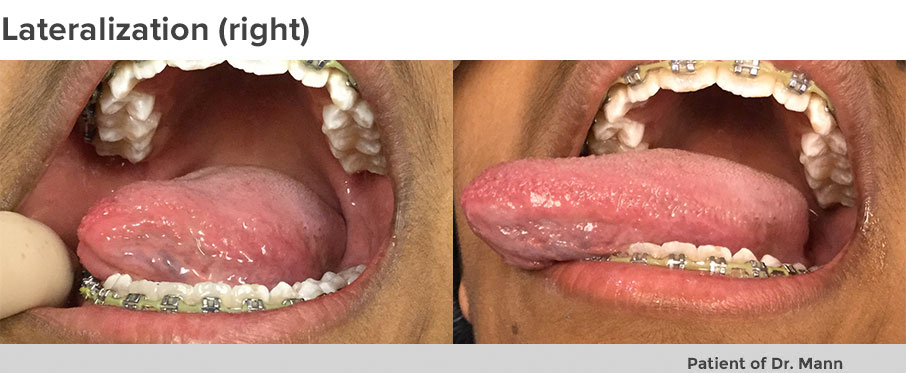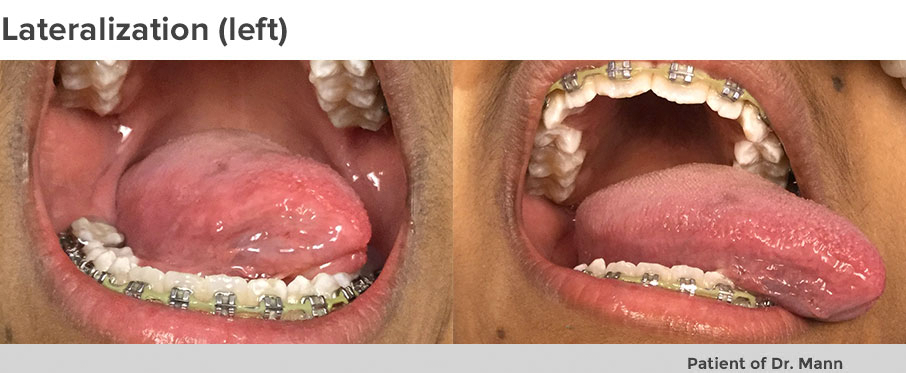Dr. Mann is an experienced provider who has helped countless families and treated thousands of tongue and lip-ties.
Dr. Mann does a thorough examination of each child and carefully reviews the symptoms, appearance, and functional issues. She educates parents so that they understand how treatment decisions are made and treatment goals, so that parents can make well informed decisions. She is easily reachable after treatment for questions, conducts careful follow up, and works closely with other related specialists as needed for complete care.
If any treatment is recommended for infants, she can often perform the frenectomy procedure on the same day, especially since families may be travelling from far away and establishing proper feeding is so time sensitive. She has treated children of all ages, ranging from infants on their way home from the hospital, to toddlers, older children, and young adults. Dr. Mann finds it incredibly rewarding to help children and their families navigate what can often be a misunderstood condition.
We all have frenums and they are visible if we lift up our lip or our tongue. Sometimes frenums do not resorb completely enough in utero during growth and development. When we were developing in utero, we actually had webbing between our fingers, which dissolved away allowing our fingers to separate. This happens similarly in our mouth, but if this happens incompletely and there’s a tiny string left, it can cause functional problems.
Frenums are only considered for treatment if they can be shown to be impairing normal function, otherwise no treatment is done. Unless a functional impairment is identified, no treatment should be done.

Dr. Mann will want to hear all about what symptoms you and your baby or child have been experiencing.
Older children may have feeding issues, difficulty eating, trouble transitioning to solids, be labelled a ‘picky’ or ‘slow eater’, pouch, choke or gag on food, if the tongue is not able to move properly to make a bolus and to swallow.
Other issues may include problems with sleep, neck pain, mouth breathing, and social issues, such being unable lick an ice cream cone or kiss, as well as increased cavities due to an inability to lick teeth clean.
It can be a lot of information, sometimes this may be the first time a parent has heard about this. Dr. Mann does not rush into treatment, she wants parents to understand and make educated decisions. For older children, she may request that the child is further evaluated by other specialists, such as a speech and language pathologist, certified myofunctional therapist, or feeding specialist before scheduling a release.
Dr. Mann works under high power magnification with a headlight. For infants, the total treatment time is 5-10 minutes, from setting up with swaddling and protective eyewear, photos, and less than a minute for the procedure. While Dr. Mann is caring for your infant, parents will watch a home care video. As soon as the treatment is done, parents are brought right into the room and home care is practiced together. The room is the families to nurse or bottle feed right away and to stay as long as they like. Detailed handouts with a link to the video and Dr. Mann’s contact information, and follow up appointments are made.
For older children, the total treatment time may be 15-20 minutes, allowing time to pick out and settle into a good Netflix show, some numbing medicine, and laughing gas, and 2-3 minutes for the procedure. For older children, as soon as the procedure is done, home care is practiced together and lots of fun prizes are given. Detailed handouts with Dr. Mann’s contact information, and follow up appointments are made.
For children, your child may need time to adjust to the new movement of their tongue or lip and will work with other related specialists such as a myofunctional, feeding, or speech pathologist.
Before and After Results

Before, the tongue tie is clearly visible with the tongue unable to lift to the roof of the mouth without closing the jaw. After treatment, the tongue is able to easily reach to the roof of the mouth.

Before the procedure, the patient could only extend his tongue a few millimeters past his lip. After the procedure, the tongue is able to extend much further.

Prior to the procedure, the patient could not extend his tongue to his back molars. After the procedure, the patient’s tongue is able to move to the left back molar teeth, allowing the tongue to clean the teeth after eating.

Prior to the procedure, the patient could not extend his tongue to his back molars. After the procedure, the patient’s tongue is able to move to the right back molar teeth, allowing the tongue to clean the teeth after eating.
Reviews
We traveled from Drums, PA and the trip was well worth it… Dr. Mann and staff are the very best! The procedure helped save our breastfeeding relationship! Thank you!
Stacey, mother
Dr. Mann is amazing!! She diagnosed and corrected the tongue and lip tie in the same visit. Great after care plan and all is well now.
Jennifer, mother
Very happy, our son now takes a bottle without choking/coughing in distress. His lip curls out on breastfeeding and bottle feeding, much more tongue movement.
Michelle, Mother
Dr. Mann was extremely nice and gentle with my son and was always reachable. It was so nice to hear from a doctor after the procedure to check-in. Very nice staff as well
Melany, mother
The wounds healed very quickly and I know that my son will avoid the speech impediment that some family members who did not have the procedure done suffer from. Nursing is also greatly improved as my baby no longer gets exhausted from working so hard at it.
Kat, mother
Even family members have commented on movement of my son’s tongue since the procedure!
Jamie, mother
I am very happy with the results. Prior to this procedure most of my day was spent breastfeeding a tired and cranky baby. Now that my son is able to eat more efficiently, we have more time to play with him and enjoy him and he’s happier too! Thank you!!
Ann, mother
So glad we made the decision to move forward with the revision. Felt a difference from the first latch after the procedure. No more pain during nursing and breast milk production seems to be going up. Baby gaining good weight! Thank you!!
Stacy, Mother
We are very happy with the results as well as Dr. Mann’s attention to detail and accuracy. I was comforted knowing I could reach out to her with concerns. I will very highly recommend her to others!
Shannon, mother
I am definitely happy with the results. It’s amazing to see my son sticking his tongue out and eating so much better. He no longer clicks, loses his latch, or leaks from the corners of his mouth. He also doesn’t seem to have to work as hard for it which is great! He certainly has a LOT more movement than he did before and we are thrilled to see that!
Jennifer, Mother
Thankfully we didn’t have major problems feeding that had surfaced pre-procedure, but latch pain is definitely improved as is milk transfer. Tongue and lip ties can cause so many problems down the road and we are glad we did this to avoid potential future problems.
Carrie, mother
Thank you for helping us on our breastfeeding journey. The results were life changing.
Jeanne, mother
I had a very difficult time initially breast feeding. She had trouble latching which caused trauma to my nipples and pain with each session. Determined to continue breast feeding, I ignored the pain, but began dreading each nursing session. We had the lip and tongue frenectomy when she was 2 weeks old. After she began to heal, her latch improved and my breasts began to improve. Now at 8 weeks, nursing is more comfortable, my nipples have healed, and we are bonding the way I envisioned.
Nicole, mother
I notice a huge difference in latch and efficiency while eating. We aren’t hungry as frequently which frees up so much time!
Alyssa, Mother
Baby is eating solids without gagging! So happy! Thank you!
Megan, mother
I’ve finally gotten to know how breastfeeding should feel.
Kristen, mother
This procedure made it possible for me to breastfeed – it was WAY too painful before this!
Linda, mother
Our son is more vocal, has more movement with tongue, makes more noises, and is able to latch better on the breast and bottle.
Ellen, mother
I’ve seen definite changes in my son’s ability to move his tongue and jaw. His latch has improved and we’re weaned off the shield. Home care was effective and he’s healed well. Thank you!
Jasmin, mother
In the beginning, breastfeeding was painful and my baby would feed for very long periods of time. My baby was also dehydrated before leaving the hospital and we needed to supplement with formula. I thought it was because I didn’t have enough milk for him, but the pediatrician told us a couple weeks later that he had a tongue tie. The tongue tie release has made feedings MUCH more efficient. We no longer need to supplement with formula, because he can now drink enough milk from me.
Amanda, mother
I was originally hesitant given that it didn’t look as if my daughter had an extreme case of tongue tie and was borderline but EXTREMELY happy with the results. She is off reflux medication which is great! Thank you!
Lisa, mother
Saw instant results, completely solved nursing problems. Thank you!
Christina, mother
We are very pleased with Dr. Mann, her staff and the entire office experience. Very comfortable with everyone and would be happy to continue the relationship. Our son is doing quite well and we are relieved to have found a great doctor. Thank you!
Kerry, mother
I didn’t even realize we had much of a nursing issue until the revision. She is my first baby and I am much happier nursing now!
Cheryl, mother
We couldn’t be more pleased with the care of everyone here or the results. We were able to avoid a feeding tube due to the prompt care and attention we received. We could never thank you enough!
Valerie, Mother
We are extremely happy with the results my son’s treatment. It made all the difference in the world and got his weight back on track!
Franz, mother
I can tell a great improvement with my son’s feeding. I was in so much pain before and now I’m not at all!
Jennifer, mother
My baby seems happier, able to move his tongue better and even baby talking!
Marta, mother
I am extremely satisfied. There is significant improvement in latch, and my nipple is no longer bruised. My son has much more mobility of tongue! Thanks so much!
Amanda, mother
Thank you! It’s incredible how much my daughter can finally move her tongue and she is able to stay on and finish a nursing session!
Cheryl, mother
My son, who had this procedure as a 12 year old, has had significant improvement in his speech and articulation. My pediatrician never caught this issue even though my son was speech delayed as a toddler and received speech therapy in elementary school. The orthodontist referred us to a speech therapist for a tongue thrust (she didn’t want to put on braces and then have his teeth go crooked again) who recommended seeing Dr. Mann after a speech evaluation. I cannot thank Dr. Mann and her staff for all of their patience, kindness, and thorough explanations regarding the procedure itself and navigating our way through insurance. I was extremely hesitant in having my son go through this procedure for he has quite a great deal of mouth sensitivity! The procedure itself was quite fast and the recovery was about a week. The pain and discomfort was managed with Advil and lasted about 4-5 days, with the first 3 days being the worst. Dr. Mann was in constant communication with me regarding post-operation care and saw him about 3-4 more times after the surgery to make sure everything was healing correctly. My son is still going for private speech therapy to basically learn the correct way to use his mouth and tongue. Overall, his speech is so much clearer and having this procedure has made such a positive difference for him.
Jen, mother